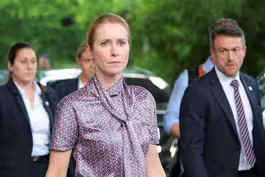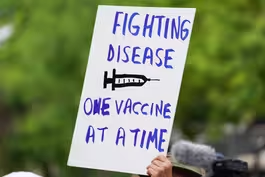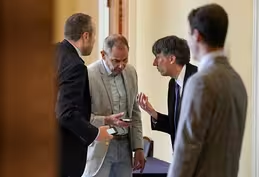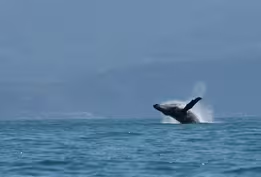
June 28, 2025 - PBS News Weekend full episode
6/28/2025 | 26m 45sVideo has Closed Captions
June 28, 2025 - PBS News Weekend full episode
June 28, 2025 - PBS News Weekend full episode
Problems playing video? | Closed Captioning Feedback
Problems playing video? | Closed Captioning Feedback
Major corporate funding for the PBS News Hour is provided by BDO, BNSF, Consumer Cellular, American Cruise Lines, and Raymond James. Funding for the PBS NewsHour Weekend is provided by...

June 28, 2025 - PBS News Weekend full episode
6/28/2025 | 26m 45sVideo has Closed Captions
June 28, 2025 - PBS News Weekend full episode
Problems playing video? | Closed Captioning Feedback
How to Watch PBS News Hour
PBS News Hour is available to stream on pbs.org and the free PBS App, available on iPhone, Apple TV, Android TV, Android smartphones, Amazon Fire TV, Amazon Fire Tablet, Roku, Samsung Smart TV, and Vizio.
Providing Support for PBS.org
Learn Moreabout PBS online sponsorshipJOHN YANG: Tonight on PBS News Weekend, a former top CDC vaccine expert explains why she resigned in protest and why she fears that changing vaccine recommendations could cost lives.
Then, how artificial intelligence is helping scientists track the wide ranging migration patterns of humpback whales.
And in our Hidden History series, pioneering comedian and activist Robin Tyler, who used humor to campaign for LGBTQ rights and fight homophobia.
WOMAN: Humor is the razor sharp edge of the truth.
It's pain and anger made funny.
So in order to make a joke, you have to believe in it.
(BREAK) JOHN YANG: Good evening, I'm John Yang.
Health Secretary Robert F. Kennedy Jr's influence on the government's approach to vaccines began to emerge this week when his handpicked advisory panel held its first meeting.
The committee pushed for a review of the entire childhood vaccine schedule, a reevaluation of hepatitis B vaccinations for babies, and walked back the long standing recommendations for flu shots containing thimerosal, a preservative that's long been the target of anti-vaccine movement.
Earlier this month, Kennedy fired all 17 members of the vaccine panel, which is called the Advisory Committee on Immunization Practices, or ACIP.
He then named eight new members, at least half of whom have expressed skepticism about some vaccines.
That prompted the resignation of Dr. Fiona Havers, one of the CDC's leading vaccine experts.
She discussed your decision with Ali Rogin.
ALI ROGIN: Dr. Havers, thank you so much for joining us.
You've said that you contemplated resigning from your post several times since Secretary Kennedy was confirmed.
Why is it that the dismissal of the entire vaccine advisory panel really the last straw for you?
DR. FIONA HAVERS, Infectious Disease Physician: The dismissal of the committee and 17 and the firing of the 17 experts was really the last straw for me because it really showed that they were planning on blowing up the whole process.
I think that the ACIP recommendations process is very regimented and evidence based.
The committee is very carefully vetted.
And when he just fired everyone on the committee and then replaced them with handpicked people that many of whom are really not qualified to be on sitting on this committee, I had no faith anymore that this process would use scientific evidence to make informed policy decisions.
ALI ROGIN: So at this last meeting of this panel, they voted on something that had not been on the agenda, the removal of the preservative thimerosal from vaccines.
So what does this all mean to you in terms of the flouting of very well established, up until this point, procedure with approving the childhood vaccine schedule and other norms?
FIONA HAVERS: No, that's a great question.
And it was really remarkable that they moved forward with this vote.
I think historically, if there's going to be a vote on a policy proposal, it requires months of preparation, a formal process and a review of evidence by a workgroup that then presents to the voting members.
What they did at this meeting was that they had a singles presentation from someone who introduced herself as a private citizen, and then they move forward immediately to a vote to change policy that potentially restricts access to certain types of vaccines that have been previously viewed as safe and effective.
And regardless of the topic of the vote, which is a separate question, the fact that they didn't follow any of these procedures for systematic review of the evidence, that is the ACIP norms, is very concerning.
So the entire direction that this is heading shows that RFK Jr. has taken over the ACIP and CDC recommendation process.
And this is a really important process because if a vaccine is recommended by ACIP and officially added to the CDC immunization schedule, it determines whether insurance will cover it.
In addition, ACIP votes on what's included in the Vaccine for Children's program, which provides free vaccines to more than half of children in the United States.
So what I'm seeing is a dismissal of the normal, very rigorous, evidence based process that ACIP usually goes through and basically RFK Jr. pushing forward anti-vaccine agenda while bypassing all of this sort of normal, rigorous science based processes that have been put in place to ensure transparency and good vaccine policy.
ALI ROGIN: You've said that one of the first alarm bells for you that led up to your decision to resign was the misleading citation that you say of some data that you presented.
I want to play a clip for you.
This is a top FDA official comparing COVID hospitalization rates among young children versus older adults.
MAN: This is cumulative COVID 19 hospitalization by age 50 to 64.
It's approximately 55 per 100,000 over the last season.
And 1 to 4 is 20 per 100,000.
If you go down to 0 to 4, it's 30 per 100,000.
ALI ROGIN: How is this a misrepresentation of your data?
FIONA HAVERS: So the problem is that he lumped all children under four into the same age group and only presented hospitalization rates for 0 to 4 or 1 to 4 as a group.
But there's a huge difference in the risk of serious COVID disease in an infant compared to a healthy four year old.
And these were precisely the data that the hospitalization system that I oversaw before I left CDC, which these numbers come from, were being evaluated by the COVID ACIP Work Group for a much more nuanced discussion of what COVID vaccination policy should be in children.
And you know, the following week after unassists, they had this that showed that video RFK Jr. announced on X the CDC no longer recommended COVID vaccines for healthy children and healthy pregnant women.
And so it's very possible that had this process been able to work itself out properly.
The ACIP work group would have come to different recommendations about vaccinating a healthy baby who is, you know, six months of age or older, who's eligible for the primary vaccination series.
They may have voted for something different for a healthy four year old who's had COVID before.
So I think that, you know, he presented data from the network that I was overseeing, but he missed all of the nuance that we had been working to present to the ACFU Work Group and then at the public meeting at which are important nuances when you're making vaccine policy for millions of children.
ALI ROGIN: Dr. Fiona Havers, thank you so much for joining us.
FIONA HAVERS: Thank you for having me on.
JOHN YANG: Tonight's other news, Senators are holding a rare Saturday session as they try to pass the tax and spending cuts bill by President Trump's Fourth of July deadline.
Overnight, Senate Republican leaders unveiled their version of the bill.
While the bulk of the measure remains the same as the House passed version, key differences remain over how much the federal government will pay to fund Medicaid programs.
The Senate also creates a $25 billion fund for rural hospitals to help offset reduced Medicaid compensation.
Hundreds of thousands of mourners line the streets of Tehran for the funeral of top military commanders and nuclear scientists killed in the 12-day war with Israel.
Their caskets were paraded through the city as mourners cursed Israel.
In the United States.
Notably missing was Iran's supreme leader, Ayatollah Ali Khamenei, who has not been seen public for weeks.
In Gaza, Palestinian officials said overnight Israeli airstrikes killed at least 62 people.
The strikes hit sites where displaced people were sheltering a tent camp in southern Khan Younis and a stadium in Gaza City.
And in the west, residents searched for bodies and belongings in a blast crater.
The attacks came after President Trump said on Friday that a ceasefire agreement could be reached within the next week.
In Minneapolis, there was a funeral former Minnesota House Speaker Melissa Hortman and her husband, Mark, who were killed earlier this month, what authorities have called a politically motivated attack.
Hundreds of mourners attended the private service in The Basilica of St. Mary, among them former President Joe Biden and former Vice President Kamala Harris.
The Hortmans are survived by their two grown children, a son and a daughter.
The man accused of killing the Hortmans is also charged with wounding State Senator John Hoffman and his wife.
Still to come on PBS News weekend, new technology that's tracking humpback whales across the globe and the life, career and achievements of comic Robin Tyler.
(BREAK) JOHN YANG: At this week's NATO summit in the Hague, President Trump declared what was for him unprecedented support for the alliance.
And at the European Union summit, leaders called for support for Ukraine and for diplomacy in the Middle East.
In the Hague, Nick Schifrin sat down with Europe's top diplomat to discuss the relationship with President Trump and the path forward with Iran.
NICK SCHIFRIN: Kaja Kallas, thanks very much.
Welcome back.
KAJA KALLAS, Vice President, European Commission: Good to be here.
NICK SCHIFRIN: Let me begin.
In the Middle East, you've declared this is the moment for Iran and the national community to return to the negotiating table.
But a US Official says that the deadlock that existed before Israel's campaign still exists.
The U.S. is demanding that Iran not enrich domestically and Iran is demanding that it does enrich domestically.
So what's the way out?
KAJA KALLAS: Which shows clearly that we need to talk.
It is not only the nuclear that is worrying us, also the missile program, also Iran's attacks, cyber and hybrid attacks on European countries, also their support to Russia in the war against Ukraine.
So diplomacy is the way.
NICK SCHIFRIN: Can U.S. and Israeli military strikes alone end Iran's nuclear program?
KAJA KALLAS: Well, they certainly set it back, but you can't erase the knowhow.
We need to have a clear agreement with them, Iran, because everybody agrees at least in Europe that Iran should not develop a nuclear weapon.
NICK SCHIFRIN: Let's come here to The Hague to the headline out of this summit, of course is an agreement by 32 NATO countries to spend three and a half percent of their GDP on weapons and one and a half percent on defense related items.
That is a unanimous statement coming out of NATO.
Does Europe believe that the US will help defend the continent?
KAJA KALLAS: Well, Article 5 is there and this is the agreement by all the parties.
So, so we don't see any signs that U.S. is stepping away from this.
I want to recall the only time that Article 5 was used was when America asked other allies to come to help.
And the country that I'm from, Estonia, actually had more combat casualties per capita than Americans had.
So, I hope that this is of course also the other way around, that Article 5 applies to all member states, allies.
And so far, you know, America has been saying Article 5 is ironclad.
NICK SCHIFRIN: You just used the word hope.
Can Europe really make plans based on a hope?
KAJA KALLAS: I immediately thought that was wrong.
So sorry about that.
No, I'm sure that America is with us because this is what all the allies have been saying.
Article 5 is ironclad.
NICK SCHIFRIN: There's also concern about how Donald Trump sees Russia itself, whether the United States and Europe or United seen Russia as an adversary.
President Trump once again said he wanted a deal with Russia.
He wanted some kind of normalization with Russia.
Can Europe make plans again for its future defense if the United States isn't with it when it comes to its assessment on Russia threat?
KAJA KALLAS: Well, it is clear how Russia, Iran more covertly, also China, but North Korea are operating together.
And that's why it is of course for us also important to see that we put the pressure on Russia so that they would also want peace.
I mean, over 100 days ago Ukraine agreed to unconditional ceasefire.
And remember, President Trump was very vocal about this, that you know, ceasefire and if he -- if you don't have that, then there are going to be consequences.
NICK SCHIFRIN: But we haven't seen those consequences.
KAJA KALLAS: We haven't seen those consequences.
But the tools are there.
So definitely, I mean, if you compare the reactions and the push for ceasefire in Iran, Israel case, then we would also hope to see the same strength when it comes to Russia.
NICK SCHIFRIN: Part of the pressure on Russia, of course can be economic.
The other part is of course militarily.
Inside Ukraine, the Biden era weapons are now beginning to run out and the Trump administration hasn't given any indication it wants to spend more money to rearm Ukraine.
The E.U.
of course taking huge steps to try and get more weapons, increase defense spending, increased production, but that takes a while.
Is Ukraine vulnerable until then?
KAJA KALLAS: It is of course hard when it comes to weapons systems.
We are doing more than we have done before.
I mean this year only we are already the military support is like 24 billion euros.
So there is still room to go.
NICK SCHIFRIN: And finally this week, Finland, Poland, Estonia, Latvia, Lithuania, of course all NATO and E.U.
members are planning to leave a landmine treaty to mine their borders with Russia to create a so called iron curtain against Russia and Belarus.
What does that say about the threat that Russia poses beyond Ukraine?
KAJA KALLAS: It says the threat is real.
So we really need to do everything to defend ourselves.
And of course all these means, I mean we have been, all these countries have been part of the Ottawa Convention.
NICK SCHIFRIN: The Landmine treaty.
KAJA KALLAS: Yeah, the landmine treaty.
NICK SCHIFIN: Yeah.
KAJA KALLAS: But we are in this situation.
I think the threat that we see coming from Russia, that's why all these countries agree to this.
It shows that this is serious.
NICK SCHIFRIN: Kaja Kallas, thank you very much.
KAJA KALLAS: Thank you.
JOHN YANG: Humpback whales are some of the largest creatures on Earth and live in every one of the planet's oceans.
Their seasonal migrations are among the longest of any mammals, stretching thousands of miles as they travel between tropical breeding grounds and colder feeding grounds.
Now scientists are using AI powered facial recognition technology to track them on their journeys, offering new insights into their habits and their health.
JOHN YANG (voice-over): Even though adult humpback whales weigh as much as 40 tons and measure up to 60 feet long, that's longer than a school bus.
They can be dwarfed by the vast open waters of the oceans.
For decades, scientists tracked them by comparing photographs of their distinctive tails.
Marine biologist Ted Cheeseman.
TED CHEESEMAN, Co-founder, Happywhale.com: Much like a face, shows recognition features.
Right.
The size of my nose, the size of my chin, all that sort of thing.
Underside of a humpback whale's tail has patterns and shapes and scars that make them individually recognizable.
JOHN YANG (voice-over): Sifting through the thousands of photographs from a month long research voyage could take up to a year.
So Cheeseman turned to image recognition technology to do the same thing.
In about two days, he built a website called Happywhale where photographs can be uploaded and analyzed.
To date, scientists and the general public have submitted more than 1 million photos, creating a global catalog of more than 100,000 individual whales.
Each new data point provides more insight into the whales movements.
TED CHEESEMAN: It's hard to grasp the scale of a whale or creature that can just casually swim from Alaska to Mexico or Hawaii every season just to find a mate and then swim back and not feed the entire time.
3, 4 months without eating at all.
That's pretty hard to grasp.
But this gets us a little closer to being able to see that.
JOHN YANG (voice-over): Researchers discovered that a whale first seen in 2013 off the coast of Colombia in South America was spotted nine years later on the other side of the globe, near Zanzibar off eastern Africa.
Tourists flock to the waters where whales congregate for a glimpse of these awesome creatures.
CECILIA RUIZ, Co-founder and Guide, Proyecto Cetaceo: Sometimes they're just like breathing and we're all like, you know, and they're just like.
And we're like oh my gosh.
JOHN YANG (voice-over): Cecilia Ruiz runs whale watching expeditions in Cabo San Lucas, Mexico.
CECILIA RUIZ: They are super important for our oceans and they're super important for just the planet health in general.
I feel like we are sometimes disconnected with nature, with living our regular lives.
JOHN YANG (voice-over): She uses Happywhale to tell her clients the stories of the whales they see.
CECILIA RUIZ: If you tell them, like, oh, this specific whale came here, had their baby, and then they saw them in Canada, and then you tell them these stories and I feel like people engage more with the whales and see them more as individuals other than just animal that is migrating.
JOHN YANG (voice-over): She calls it Facebook for whales.
CECILIA RUIZ: I get notifications still like, hey, the whale you saw on January, it's now here, you know?
JOHN YANG (voice-over): About a third of the images on Happywhale are contributed by the public.
Earlier this year, a tourist on a whale watching cruise in Hawaii uploaded a photograph of what turned out to be the world's oldest known humpback whale called Old Timer.
The male was first identified by a scientist in 1972, making him at least 53 years old.
Crowdsourcing whale tracking has been a boon for scientists like Ted Cheeseman.
TED CHEESEMAN: We're able to actually see, thanks to the public's involvement, quite a lot more resolution with the science.
JOHN YANG (voice-over): With it, they can monitor how whales are coping with the threats posed by warming seas, being struck by ships and entangled in long lines used by commercial fishermen.
Scientists use that information to model population growth and even estimate the survival rate of individual whales.
Commercial whaling decimated the humpback whale's population in the 19th and 20th centuries.
It's recovered thanks to conservation efforts, which can be supported by the data Happywhale generation.
And Cheeseman says the public awareness the website generates is a benefit in itself.
TED CHEESEMAN: We published a lot of research papers as a result of the data that's flowing through this, and I think that's really meaningful and worthwhile.
But I think the publicly engaging side of it, the fact that this brings us closer to a very impressive and rather magical and hard to understand element of the.
Of the natural world, is probably what I'm most proud of.
JOHN YANG: And finally tonight, as Pride Month wraps up, a look at a pioneering LGBTQ comedian and activist.
In 1979, Robin Tyler became the first out lesbian comic to appear on national television.
She used both her humor and her platform to become an important voice in the push for LGBTQ rights and equality.
This is part of our series Hidden Histories.
Robin, thanks for joining us.
You were born on the prairie of Manitoba, in Winnipeg.
ROBIN TYLER, Comedian Activist: Yes.
JOHN YANG: How did you get into show business from there?
ROBIN TYLER: I moved to New York when I was 19 or 20.
I emigrated here, and you had to sign something saying you weren't a communist, you weren't a drug addict, or you weren't a homosexual.
So I signed it because I wasn't a homosexual.
I was a lesbian.
And I moved to New York to break into show business.
And I went to a drag ball and I got arrested.
They raided it and I got arrested for female impersonation.
So they took me to jail, and all the queens, oh, she's a girl.
And the cops, that's what you all call each other.
So they finally let me go because a newspaper person came to look at me.
And I ended up going to the 82 Club of becoming a female impersonator.
And I did Judy Garland.
Only in those days, you had to do the real voice.
You couldn't lip sync so long.
So I ended up becoming one of the most famous female impersonators.
JOHN YANG: What was the comedy scene like for an out comedian back then?
ROBIN TYLER: Well, you know, I started working out at the Comedy Store, and it was very difficult.
It wasn't just a matter of being out, but the jokes in the 70s and 80s were all these sexist and misogynist jokes.
So I became a comic with my partner, Pat Harrison.
We became a comedy team.
And we took all of our jokes that men did on women, and we did them on men.
And guess what we found out?
Men didn't have a sense of humor.
So when men do jokes on Women, it's called funny.
But when women did jokes on men, it was called anti-male.
So that's kind of how we started out.
Comedy has always reflected the civil rights movement.
In the 60s, when the black civil rights movement was prevalent, went from Flip Wilson.
All of a sudden Richard Pryor started telling the truth, right, in the 70s, women's liberation.
So you had great comics like Elaine Boozer and Lotus Weinstock.
And then in the 80s, the Gay Liberation Movement came out.
The first march on Washington was 1979.
And so all of a sudden, gays always did humor.
But the humor that was done on us was making us the object rather than the subject of humor.
And all of a sudden we came up and we could do humor.
And I did my first comedy album called Always a Bridesmaid, Never a Groom, which is about coming out to my mother.
And so, you know, when we started to do jokes that were about us rather than on us, we started getting laughs.
But it wasn't easy.
JOHN YANG: How did you make that move from being an entertainer to be an activist?
ROBIN TYLER: The women's liberation movement came along and Pat Harrison and I were a comedy team.
Women didn't have sports scholarships, so went onto the field during a Rams-Raider football game and we ran.
It was very hard to run on a football field.
And we called for more sports scholarships for women.
And we got on like the front pages all over.
Patti and I were able to use comedy as part of our activism.
Even now when I speak at the marches, I always do humor first and then I do a speech.
And the comedy disarms people.
Humor is the razor sharp edge of the truth.
It's pain and anger made funny.
So in order to make a joke, you have to believe in it.
JOHN YANG: How would you like to be remembered as a great comic or a great activist?
ROBIN TYLER: Well, I don't want to be remembered because I don't want to die.
But I guess if I were to describe myself, you know, both go hand.
I'm not one without the other.
So I guess what I really was the laughing warrior.
I don't come from anger.
I come from loving freedom, loving equality.
Because if you're just angry all the time, all you're going to do is burn yourself out and chase everybody away.
That's not how you change hearts and minds.
You know what?
I've always said I'm very lucky in my life because passion is better than Prozac.
JOHN YANG: Very good.
Robin Tyler, Happy pride.
Thank you very much.
ROBIN TYLER: Well, thank you.
JOHN YANG: And that is PBS News Weekend for this Saturday.
I'm John Yang.
For all of my colleagues, thanks for joining us.
See you tomorrow.
Europe’s top diplomat discusses EU’s relationship with Trump
Video has Closed Captions
Clip: 6/28/2025 | 5m 31s | Europe’s top diplomat discusses EU’s relationship with Trump and next steps for Iran (5m 31s)
Former top CDC vaccine expert on why she resigned in protest
Video has Closed Captions
Clip: 6/28/2025 | 5m 53s | Former top CDC vaccine expert on why she resigned in protest over firing of advisory panel (5m 53s)
How comedian Robin Tyler fought for LGBTQ+ rights with humor
Video has Closed Captions
Clip: 6/28/2025 | 4m 49s | How pioneering comedian Robin Tyler used humor to fight for LGBTQ+ rights (4m 49s)
News Wrap: GOP unveils Senate version of Trump’s big bill
Video has Closed Captions
Clip: 6/28/2025 | 2m 9s | News Wrap: Senate Republicans unveil their version of Trump’s big budget bill (2m 9s)
Scientists track humpback whale migration with help from AI
Video has Closed Captions
Clip: 6/28/2025 | 5m 10s | Scientists track humpback whale migration with an assist from AI technology (5m 10s)
Providing Support for PBS.org
Learn Moreabout PBS online sponsorshipSupport for PBS provided by:
Major corporate funding for the PBS News Hour is provided by BDO, BNSF, Consumer Cellular, American Cruise Lines, and Raymond James. Funding for the PBS NewsHour Weekend is provided by...
















